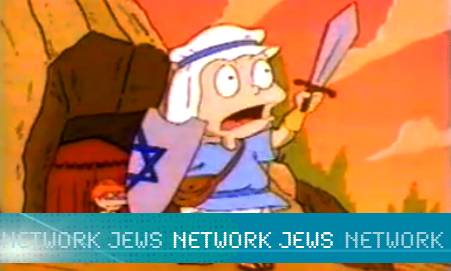“A macca-baby’s gotta do what a macca-baby’s gotta do!”
It’s Hanukkah this week, the perfect time to catch up with everyone’s favorite animated baby, Tommy Pickles, who, following that rousing war cry, defeats King Antiochus, once again inserting himself into the stories read to him by his parents and grandparents.
In every episode of Rugrats—a favorite Nickelodeon nostalgia trip for anyone who grew up in the ‘90s—Tommy serves as the brave, adventurous de-facto leader of the babies: twins Phil and Lil, neurotic Chuckie, and, in the show’s later seasons, brother Dill. He is, of course, the hero of every Rugrats story; always wanting to do the right thing and hatching crazy-sounding plans for his friends to enact, as long as Tommy’s mean older cousin, Angelica, doesn’t get in their way.
Debuting in 1996, A Rugrats Chanukah was the first-ever animated Hanukkah special. While Hanukkah episodes—animated or live-action—are par for the course these days, with everyone from Wallace Shawn on Gossip Girl to Stephen Colbert taking part in celebrations, Rugrats was a trailblazer in Jewish-holiday themed episodes.
A Rugrats Chanukah has all of the tropes of a typical Rugrats episode, but also throws in Tommy’s rarely seen maternal grandparents. Tommy’s mother, Didi, is Jewish, while her father, Stu, is Christian. Jewish holiday episodes pay special attention to Didi’s parents Boris and Minka, who hail from “the old country,” or Russia. While Tommy’s Jewishness doesn’t come into play often, Rugrats became a personal favorite for its holiday specials on Passover and Hanukkah, which my sister and I watched year after year.
Tommy, curious as always, wonders why his mom is making pancakes (latkes) at night, instead of for breakfast, and why the family lit candles when it wasn’t anyone’s birthday.
“Chanukah is that special time of year between Christmas and Thanksgiving, when all the bestest holiday shows are on TV,” Angelica explains to the babies, in a pretty meta joke for a kids show, teaching them to make a guttural “Chhhh” sound at the beginning of the word.
Boris and Minka don’t appear in many episodes, since, unlike Grandpa Lou, they don’t live with the Pickles family, but they always show up for celebrations, like Tommy’s first birthday. They are old and somewhat crotchety, speak with heavy Yiddish accents and have hook noses. This did not sit well with the Anti-Defamation League, which, in 1998, called Boris’ design anti-Semitic and similar to Nazi-era depictions of Jews. I always found the design to be excusable, since Boris and Minka are generally portrayed in a fond light, and are based on Rugrats co-creator Arlene Klasky’s actual relatives.
On Hannukah, Boris’ frenemy from the Old Country, Shlomo, steals the spotlight, leading Boris to yell gonif ahead of the synagogue play titled “The Meaning of Hanukkah.”
As always, Tommy and the gang don’t quite understand what’s going on, though they’re perceptive enough to realize something is wrong, and hilariously decide Grandpa Boris doesn’t want to play with “the meanie of Hanukkah”—Shlomo—who must be stopped.
On the way to Shlomo and Boris’ inevitable reconciliation (this is a kids’ show, after all), Tommy and the gang go through all of the standard tropes that make Rugrats so much fun. They imagine themselves as characters in well-known stories—in this case Tommy as Judah Maccabee, and Phil and Lil as Jews assimilated into Greek culture.
Tommy plays the hero on in real life, too, after Angelica—who is the meanie every day of the year—snatches the TV to watch a Christmas special and breaks it. Thinking on his feet, he brings a book to Shlomo, which he reads to the babies, showing them, and Boris, that he’s not such a meanie, after all.
Previously on Network Jews:
Willow Rosenberg, the lesbian witch on Buffy the Vampire Slayer
Andrea Zuckerman, the Brainy Girl on Beverly Hills, 90210
Lilith Sternin, the Ex-Wife From Hell on Frasier









